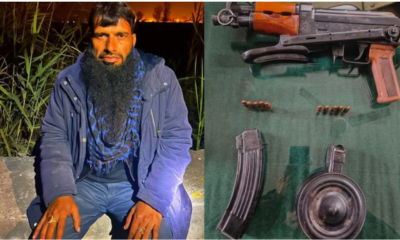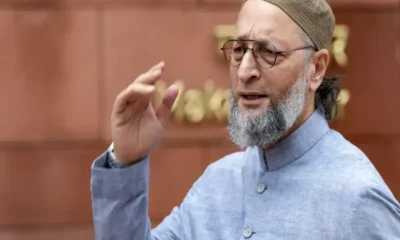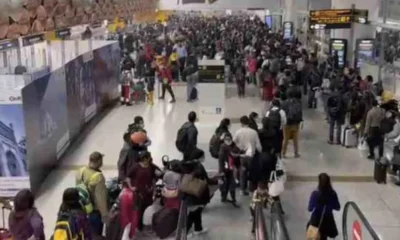[vc_row][vc_column][vc_column_text]Islam means peace, fight against terror not against any religion: Sushma Swaraj at OIC
In a significant diplomatic gain for India, External Affairs Minister Sushma Swaraj today (Friday, March 1) became the first Indian minister to address a summit of the Organisation of Islamic Cooperation (OIC) states at Abu Dhabi.
The minister was invited as a guest of honour by the UAE to the the two-day 46th session of the Council of Foreign Ministers of the 57-member body.
Pakistan foreign minister Shah Mahmood Qureshi stayed away from the meet, saying it objected to India’s presence at the event. He said that lower ranking officials would attend to represent Pakistan’s interests.
Addressing the 46th session of Council of Foreign Ministers of the OIC at Abu Dhabi, Swaraj said that India, Pakistan and Bangladesh have all been affected by terrorism. She said terrorism is destroying lives, destabilising regions and putting the world at great peril.
“Terror reach is growing and the toll it is taking is increasing. This is not a clash of civilisations or cultures, but a contest of ideas and ideals. As PM Narendra Modi has often said, it is a struggle between the values of humanism and the forces of inhumanity,” she said.
Terrorism, she said, is driven by distortion of religion: “Terrorism and extremism bear different names and labels. It uses diverse causes. But in each case, it is driven by distortion of religion, and a misguided belief in its power to succeed.”
Also Read: Bollywood celebs reaction over IAF pilot ‘Abhinandan Varthaman’ returning India
“Just as Islam means peace, none of the 99 names of Allah mean violence. Similarly every religion stands for peace,” she said.
She quoted the ancient Sanskrit scripture ‘Rig Veda’ to say that pluralism is crucial to India. “Ekam sat vipra bahudha vadhanti”, which means “God is One but learned men describe him in many ways,” she said.
“I come from the land of Mahatma Gandhi where every prayer ends with call for ‘shanti’ that is peace for all. I convey our best wishes, support and solidarity in your quest for stability, peace, harmony, economic growth and prosperity for your people and world,” she said.
Urging countries to come together and block terror funding, Sushma Swaraj said, “If we want to save humanity, then we need to tell nations supporting terror that they need to stop funding terror organisations.”
She further emphasised on the fact that the fight against terror cannot be won by war or intelligence.
Upholding the diversity of India, Sushma Swaraj said that India has always embraced pluralism. Muslims in India practice their respective beliefs and live in harmony with each other and with their non-Muslim brothers. It’s this appreciation of diversity and coexistence that has ensured that very few Muslims in India have fallen prey to poisonous propaganda of radicalist and extremist ideologies.”
Lauding the Islamic countries for their efforts if stifling terrorism, Sushma Swaraj said, “Choices you (OIC) make have a huge inpact on humanity. We are with you.”
“Terrorism is destroying lives, destabilising regions and putting the world at great peril. Terror reach is growing and the toll it is taking is increasing,” Swaraj said.
Bringing up the issue of terrorism at the conclave, Swaraj said that the peril of terrorism is growing in Pakistan, India and Bangladesh. “We see the terrible face of terror. We are witnessing the terrible and senseless destruction of terrorism. Terror is growing and we are seeing the terrible face of terror in many of our countries.”
Sushma Swaraj said that she is honoured to join colleagues from nations that represent a great religion and ancient civilisations. “I stand here as a representative of the land that has been a mountain of knowledge, beacon of peace, the source of faith & traditions, home to many religions and one of the major economies.”
“India has excellent political ties with many as a result of our economic growth. We share warm times with our immediate Islamic neighbours like Bangladesh and Afghanistan. Presently gulf countries are our biggest markets and energy partners,” said Swaraj
Also Read: IAF pilot Wing Commander Abhinandan Varthaman to be released tomorrow, says Imran Khan
Thanking member nations of OIC for inviting India and hearing its voice, Sushma Swaraj said, “OIC members constitute one-fourth of the United Nations and almost a quarter of humanity. India shares much with you, many of us have shared dark days of colonialism.”
Sushma Swaraj in her opening speech acknowledged that Muslims peacefully live in India in harmony with different other cultures. “Our Muslim community is a microcosm of India. They speak different languages and have different culinary tastes. Very few Muslims in India have fallen prey to terror and terrorism,” she said.
While India attended the Islamic organisation meet, Pakistan minister Shah Mehmood Qureshi said that he will skip the Organisation of Islamic Cooperation (OIC) meet in Abu Dhabi because India has been invited to the event. “I will not attend Council of Foreign Ministers as a matter of principle for having extended invitation as a Guest of Honour to Sushma Swaraj,” Shah Mahmood Qureshi said in parliament, adding that other officials would attend to represent Pakistan’s interests.
India, on its part, said that the invitation was taking forward the strong bilateral ties that UAE and India shared and it was also a “welcome recognition of the presence of 185 million Muslims in India and of their contribution to its pluralistic ethos and of India’s contribution to the Islamic world.”
The invitation to India is seen as a key foreign policy success in efforts to strengthen relations with Arab and Muslim-majority countries. OIC states it is the collective voice of the Muslim world and works to safeguard their interests. With permanent representatives to the United Nations and the European Union, it has 57 member states.
Islamabad had conveyed its concerns over New Delhi’s participation at the OIC in the wake of the Indian air strike on a Jaish-e-Mohammed (JeM) camp at Balakot on Tuesday. Acting largely due to pressure from Pakistan, OIC had condemned the air strike as an “incursion and aerial violation” and urged both countries to seek peaceful solutions to the crisis through dialogue.
In a response to the bloodiest terror attack in the history of insurgency in Kashmir in which 40 jawans were killed in a fidayeen attack using vehicle borne explosive device, India on February 26, announced that it had destroyed Jaish-e-Mohammed (JeM, which had owned responsibility for the terrorist act) training camp in Balakot in Pakistan.
A day later, Pakistan Airforce struck India in a tit-for-tat move. The Indian Air Force retaliated and in the ensuing dogfight, IAF pilot Abhinandan was captured by Pakistani officials. He is all set to be released later on Friday.
During the strikes and counter strikes, Qureshi had threatened to boycott the OIC if the invite to India was not retracted. He informed his Parliament, on Friday, that the UAE said that the invite would be “hard to retract”, thus forcing him to be remain absent from the OIC, of which his country is a founding member.
Pakistan has been staunch opponent to India getting even an observer status, let alone become a member of the OIC.[/vc_column_text][/vc_column][/vc_row]

























